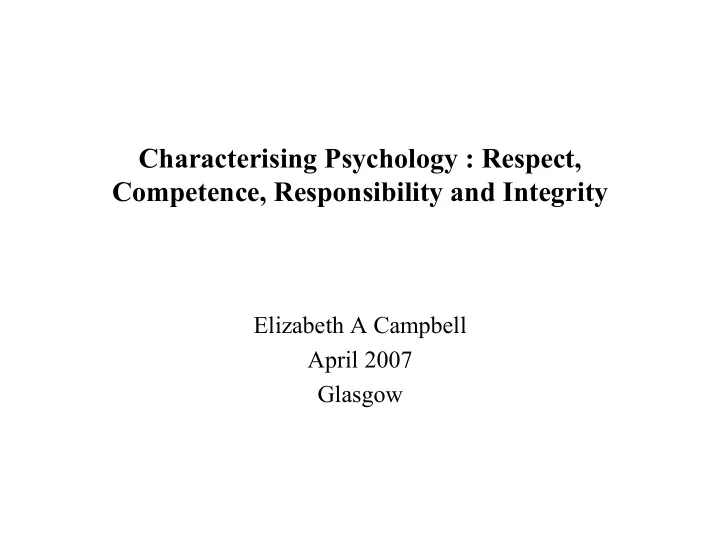

Characterising Psychology : Respect, Competence, Responsibility and Integrity Elizabeth A Campbell April 2007 Glasgow
A sermon • Ethical approach • Values and Statutory Regulation • Psychological Professions Council • Competencies • Wardrobe –v- Character • Implications for the BPS
Code of Ethics and Conduct • March 2006 • Advisory framework in support of professional judgement • Principles – respect, competence,responsibility and integrity • Move from “Conduct” to “Values” : emphasis not behaviour but process of decision making • Move from punitive to empowering
Values and regulation • Principles agreed by the Society : • public must be fully and completely protected all areas of applied psychology must be regulated to ensure that the discipline/profession is not split • the title to be regulated shall be 'psychologist‘ • a 'psychologist' is defined as a person with Doctoral level qualifications/competences • all those that need to be regulated have to be regulated (i.e. all those that offer services to the public) • there will be no reduction in standards in all areas relating to regulation and professional recognition from those currently enjoyed by Chartered Psychologists
Foster review : Five principles • Proportionate • Accountable • Consistent • Transparent • Targeted Society view = HPC cannot meet these principles at an acceptable standard for public protection
Psychological Professions Council • Association of Educational Psychologists • United Kingdom Council for Psychotherapy • British Association for Counselling and Psychotherapy • British Association for Behavioural and Cognitive Psychotherapies • National Association of Principal Educational Psychologists • British Association for Sports and Exercise Sciences • Association of Business Psychologists • Association of Heads of Psychology Departments
PPC • Those who use a psychological knowledge base to underpin their practice • Different sections within a register • Estimated register of around 100,000
What is our “Character” ? • Routed in the science of psychology • Scientists and practitioners • Not just therapists or technicians
What are our “Competencies” ? • Move from core curriculum to core competencies in professional education • EuroPsy – mixed model of curriculum plus core competencies • Mutual Recognition Agreement in Canada from 2003 based on competency • No agreement among US regulators re domains of competency but movement towards this
Advantages of a competency approach • Makes learning outcomes explicit • Provides flexible routes for acquisition • Integrates theory and practice • Provides a structure for monitoring individual progress • Provides a framework for public and psychologists to understand the profession • Allows mobility
Competence ¡is ¡a ¡narrow ¡ideal. ¡Competence ¡makes ¡the ¡ trains ¡run ¡on ¡time ¡but ¡doesn't ¡know ¡where ¡they're ¡going. George Bush , speech (accepting nomination for President, 1988)
Is competency enough ? • As scientist –practitoners, aspiration is for excellence as well as competency • Competing definitions of core competency- not always agreement about what psychologists should do • Can lead to fragmentation/reification • Can lead to an overemphasis on technical skills
The wardrobe model of competency
Health psychology (including HIV / AIDS) Management and planning Research Teaching Counselling Work Areas: Adults Community/social Family and couples Health/medical Organisational Students and young people Occupational Work Areas: Counselling and personal development Design of environments and of work Employee relations and motivation Human-machine interaction Organisational development Performance appraisal and career development Personnel selection and assessment Training Social Services Settings Work Areas: Teaching psychological skills and counselling Health Work Areas: Chronic & Acute Pain Communications Facilitating behaviour change Health Professional Training Health Services Research & Evaluation Obesity Rehabilitation Self-management Sport and Exercise Work Areas: Sport & Exercise Psychology
Clinical Work Areas: Adult mental health - General Forensic services Health psychology (including HIV / AIDS) Learning disabilities (mental handicap) Management and planning Teaching Forensic Work Areas: Family/domestic issues and children Management of individuals prior to custody Management of offenders following conviction for an offence Policy issues The assessment of offenders Victims of crime Social Services Settings Work Areas: Child protection Counselling & direct psychological intervention with clients Offending Personnel selection Psychological aspects of disasters Services to people with learning difficulties Child Clinical Work Areas: Adolescents / young people Assessment & treatment of emotional/behavioural/mental health difficulties Assessment & treatment of learning disabilities & educational difficulties Assessment & treatment of problems associated with acute and chronic illness Children Act/child protection assessment & treatment Consultation & supervision Medico-legal expert witness services Parenting skills Teaching & training
The wardrobe model of competency • What matters is the label • Appearance is everything • Once bought it can be hung up and never use again • The clothes matter not the person • Some items go out of fashion • You can put items together to make a whole outfit, but it might not work
The character model of competency • Developmental • Commitment to certain values • Espousal of a set of principles • Rooted in understanding rather than just performance, allows innovation • Based on education not training • Integrated with the person, it matters who is wearing the clothes
Problems with BPS approach to competency • Invested in specialist titles…..proliferation of titles • Titles do not help public • Divisions more concerned to emphasise differences than commonalities • Published directories allow self declared competencies
Where do we go from here ? • BPS has taken a high moral stance re public protection • Need to take the same moral stance internally to ensure that professional psychologists operating at equivalent levels of core competence and that psychologists meet character requirements • Shift from a reliance on titles to a reliance on practice routed in an ethical claim to competency • Examine the practices within the Society to see if we are meeting our own values
Annual Conference Division of Smurf Psychology
Recommend
More recommend